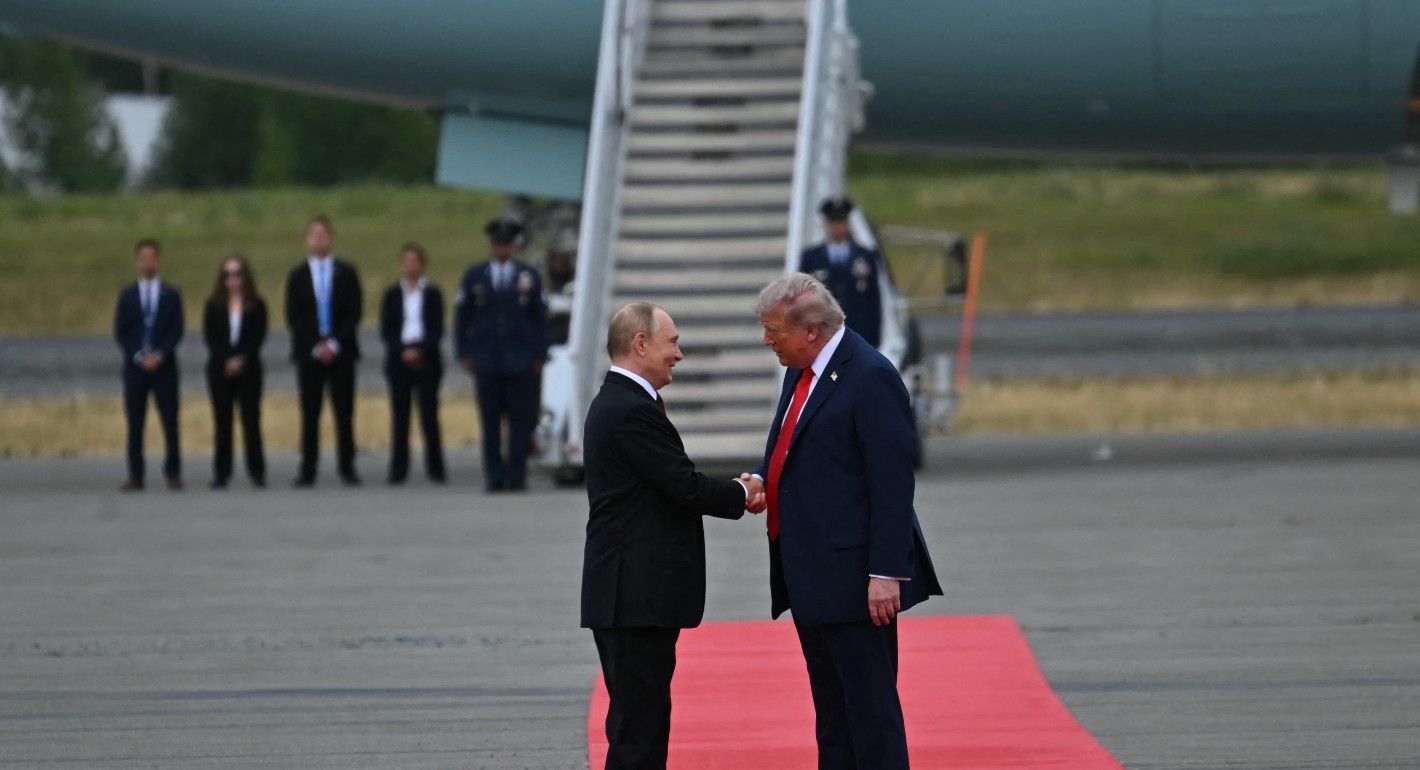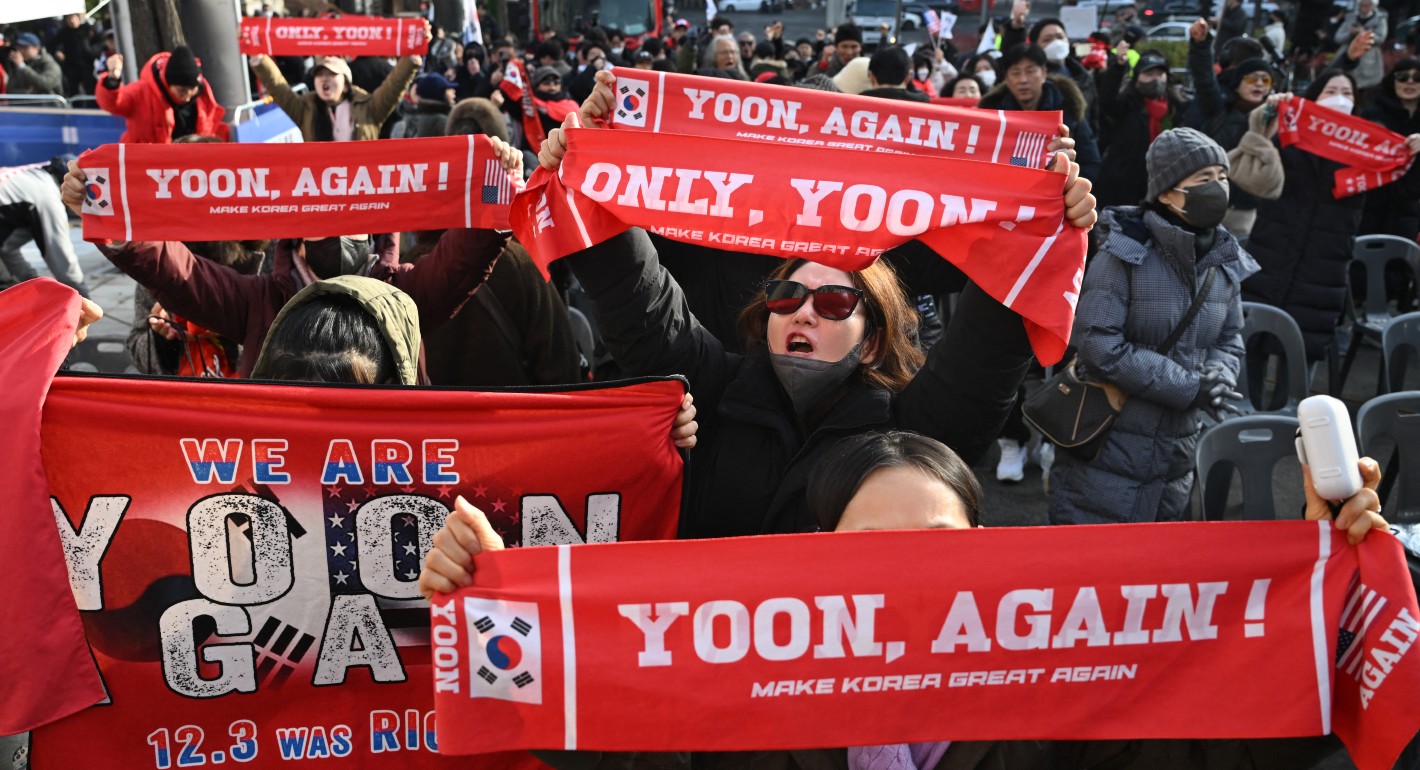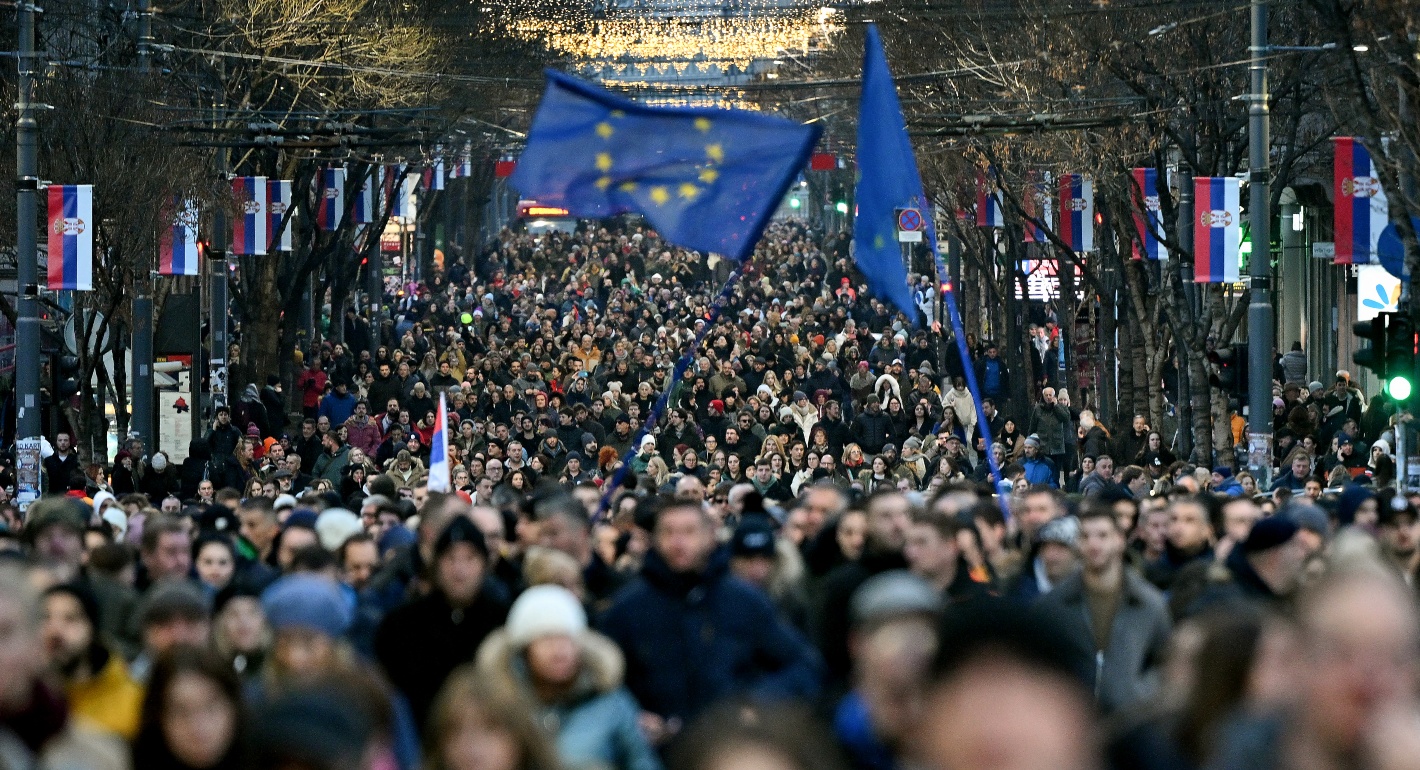On August 15, U.S. President Donald Trump welcomed onto American soil the premier dictator of the age, Russian President Vladimir Putin. Trump uttered no words of criticism about his ruthless guest, the mastermind of the illegal invasion of and atrocities committed in Ukraine. Instead, the U.S. president pledged diplomatic support for an eventual peace settlement that would legitimize Russia’s naked aggression against and seizure of territories from a sovereign UN member state, in one of history’s most blatant violations of the UN Charter.
Trump’s coddling of Putin was no surprise. The president’s envy of autocrats and own authoritarian instincts are well established. Unlike his predecessors, who championed an American-led “free world,” Trump is content with a world in chains. Accordingly, he has discarded America’s historic support for democracy abroad and dismantled the infrastructure and funding created to promote it.
American democracy promotion has always been selective, plagued by hypocrisy, and susceptible to overreach. But Trump’s utter indifference to the cause of liberty is something new in U.S. global engagement. Beyond abandoning beleaguered democrats around the world, his cynical posture promises to reshape global order, accelerating the rise of illiberal multilateralism. It will create a vicious cycle. As domestic governance deteriorates globally, institutions of international governance will become dominated by authoritarian and reactionary forces bent on reversing global progress on freedom and equality and minimizing the constraints of international norms and law on national behavior. The outcome will be a global order that is even more amoral, repressive, and conflictual. In short, a world unsafe for democracy.
The Dismantling of Democracy Promotion
Trump’s demolition of America’s democracy promotion apparatus is among the most disastrous and dumbfounding steps he has taken to overhaul U.S. foreign policy. At the outset of 2025, the United States was the most influential promoter and largest funder of global democratization efforts. Those days are over. The administration has dismantled the U.S. Agency for International Development, a critical source of democracy funding and programming; shuttered the State Department’s Bureau of Democracy, Human Rights and Labor, formerly the diplomatic focal point for U.S. democracy promotion; defunded the National Endowment for Democracy and its affiliates, including the International Republican Institute and the National Democratic Institute; closed the U.S. Agency for Global Media, home of Voice of America, Radio Free Europe, Radio Free Asia, and similar outlets; and cut hundreds of millions of additional dollars in democracy promotion spending through unprecedented recissions of previously appropriated funds.
The administration’s actions have reverberated internationally, as my colleagues Thomas Carothers, Rachel Kleinfeld, and Richard Youngs document, undermining the broader democracy promotion ecosystem. More than 80 percent of U.S. democracy assistance has vaporized, forcing activists, international organizations, and nongovernmental and private sector implementers around the world to curtail or close operations and offices. Going forward, anticorruption advocates, election observers, human rights monitors, independent media organizations, and others will need to look elsewhere for diplomatic support and financing.
This disruption comes at a perilous moment. The global democratic recession is now in its nineteenth straight year, according to Freedom House. And for the first time in two decades, reports the V-Dem Institute, nondemocracies now outnumber democracies ninety-one to eighty-eight. Well before Trump’s return, the world’s democracies were on unstable ground, thanks to external threats and internal weaknesses. China and Russia have embarked on an increasingly brazen effort to make the world safe for autocracy by propping up fellow dictatorships, supporting authoritarian parties and leaders in partial democracies, and spreading disinformation and sowing division in consolidated ones. At the same time, established democracies are being hollowed out from within by rising political polarization and surging distrust of institutions.
Within the United Nations and other multilateral bodies, countries that have long stood beside the United States and counted on its leadership in defending democratic norms—not least the members of the European Union—find themselves without their comrade-in-arms. This would be bad enough if the United States simply took its democracy promotion ball and went home with it, metaphorically speaking. But Trump is actively supporting autocracy abroad, as well as indulging his authoritarian instincts at home. He has repositioned the United States to support far-right political parties in Europe, such as the Alternative for Germany, and has punished Brazil for prosecuting Jair Bolsonaro, another former president who encouraged violence to overturn his electoral defeat. Domestically, the White House has threatened an independent judiciary, ignored Congress’s constitutional prerogatives, intimidated media outlets, chilled free speech at universities, deported immigrants and arrested protesters without due process, and enabled crony capitalism by bestowing favors on well-connected donors.
To those accustomed to the United States as a defender of freedom, these are disorienting days. In July, Secretary of State Marco Rubio—previously a fervent champion of democracy during his tenure in the U.S. Senate—told U.S. diplomats that the United States would henceforth sharply restrict any commentary on the conduct of foreign elections. Accordingly, they “should avoid opining on the fairness or integrity of an electoral process, its legitimacy, or the democratic values of the country in question.” This muzzling edict reflects the president’s America First view that bilateral relations should be solely informed by narrow national interests, rather than pesky concerns about how a foreign government treats its citizens.
In practice, the administration continues to employ such judgments as a selective cudgel. In mid-August, the State Department released a truncated and politicized installment of its previously comprehensive and rigorous annual human rights report. This new edition sharply curtails formal criticism of abuses and corruption by favored administration allies such as El Salvador and Israel, while condemning adversaries such as Venezuela. The report also takes aim at major developing country democracies with which the Trump administration has frosty relations. It chastises Brazil for “disproportionately suppressing the speech of [Bolsonaro’s] supporters,” as well as South Africa, for allegedly tolerating abuse of white farmers in that country. The report even criticizes France and the United Kingdom for censoring far-right political voices with links to the MAGA movement.
A Tradition Upended—and a World Imperiled
The Trump administration’s hostility to democracy promotion and indifference to democratic solidarity are disturbing departures from decades of U.S. foreign policy. They will also corrode the quality of global order and damage prospects for international cooperation.
Support for democracy was at the heart of America’s post-1945 liberal world order–building project, and cohesion among democracies helps explain why the international system it created was so institutionalized and resilient. Western democracies formed the core of the “Free World” coalition that the United States rallied to contain Soviet communism, as well as the open international economic system that emerged under U.S. leadership. Tellingly, this unity survived the end of the Cold War. Although some predicted that the collapse of the Soviet Union would bring European instability and spur other Western democracies to balance against American power, this new era saw a deepening and expanding of the ties that bound them to the United States, and a reinvigorated attention to promoting democracy worldwide.
For the past eight decades, a common dedication to democracy has been an integral component of Western solidarity. The preamble to the North Atlantic Treaty gives voice to these ideals, committing its signatories to “safeguard the freedom, common heritage and civilisation of their peoples, founded on the principles of democracy, individual liberty and the rule of law.” These sentiments cannot be dismissed as mawkish window-dressing any more than the Cold War can be reduced to a pure power contest devoid of ideological meaning. A shared attachment to democracy shaped how Western nations understood and defined their national interests, communicated with one another, and resolved diplomatic disputes among themselves, so that (for instance) war among them became inconceivable. These shared principles and institutions helped the liberal international order endure, because it turns out that democracies are better positioned to make credible commitments, by virtue of their political transparency and internal checks and balances. Democratic solidarity shaped the agendas and actions of major Western institutions such as NATO, the G7, and the Organisation for Economic Co-operation and Development, and reinforced common Western positions within more encompassing bodies like the United Nations.
To be sure, Western democracies have faced mounting challenges in the twenty-first century. In the early post-Cold War years, there was heady if naïve optimism that the world’s community of market democracies would inexorably expand, as the winds of freedom and forces of globalization integrated emerging powers, post-Soviet nations, and developing regions into an open, rule-bound international order dominated by free societies and free markets. As it happened, many emerging powers, most notably China, defied assumptions about the linkage between economic and political liberalization. Simultaneously, the quality and vitality of democracy in many Western nations also deteriorated, trends exacerbated by growing economic inequality and policy failures, including responses to the global financial crisis of 2008. Yet despite these and other shocks, including the first Trump administration, the Western democratic heart of the liberal world order continued beating into the 2020s.
Trump’s return to the White House puts all this at risk. By definitively abandoning America’s self-appointed historic mission, the second Trump administration has deprived the world of its leading arsenal of democracy, forcing defenders of freedom to regroup and rethink their strategies. But the implications of America’s anti-democratic turn for world order run even deeper, sounding the death knell of the already beleaguered liberal core of the open, rules-based international system. Reflecting in April on the gravity of the Trump revolution, European Commission President Ursula von der Leyen put it bluntly: “The West as we knew it no longer exists.” The demise of the democratic West threatens the resilience of multilateral institutions, the strength of international law, and prospects for effective international cooperation. It will hasten the rise of illiberal multilateralism.
American democracy promotion has often been criticized as utopian, and has been susceptible to overreach, as in President Joe Biden’s “summits for democracy.” But it has also had an underlying strategic logic rooted in self-interest as well as values. Beyond the principled conviction that legitimate political authority lies in the consent of the governed, it reflects causal beliefs in the mutually reinforcing nature of free societies, open markets, and peace.
The historical roots of the so-called democratic peace theory run deep, dating back to Enlightenment writings of John Locke and particularly Immanuel Kant, who identified a world of liberal republics as a precondition for “perpetual peace.” The most well-known American evangelist for the connection between democracy and peace was of course Woodrow Wilson, who was convinced that global collective security would function only if a majority of states and all of great powers were self-determining democracies. “No peace can last, or ought to last, which does not recognize and accept the principle that governments derive all their just powers from the consent of the governed,” he told the Senate in January 1917. Three months later, requesting a declaration of war against Germany, he outlined his ultimate objective for postwar order: “The world must be made safe for democracy.” Although Wilson failed to secure U.S. membership in the League of Nations, his post-1945 successors shared his belief that a world dominated by democratic states would be more prosperous, just, pacific, and cooperative—and his conviction that the United States was uniquely positioned by virtue of its power and example to lead the global advance of human freedom.
Trump’s rejection of this strategic logic not only deprives democracy of its leading global champion; it also portends a less cooperative, normatively shallower international order. In other words, the menace Trump poses to domestic constitutionalism and the threat he poses to global constitutionalism are intertwined.
Some skeptics of U.S. democracy promotion may welcome this downgrading of American ambitions. Self-styled realists, in particular, have long complained that U.S. preoccupation with fostering freedom is both impractical and imprudent. It exaggerates America’s capacity to engineer the internal political evolution of other countries, and it needlessly complicates relations with other great powers, creating diplomatic tensions that impede practical cooperation. It would be far better, they argue, for the United States to ignore differences in regime type and focus on negotiating limited rules of the road that can facilitate peaceful coexistence, enable crisis management, minimize cross-border spillovers, and permit modest collective action on shared dilemmas such as nuclear proliferation, pandemic disease, and climate change. As a historical model, they often invoke the nineteenth century Concert of Europe, which allowed Europe’s five great powers—liberal Britain and France and conservative Austria, Prussia, and Russia—to act jointly on critical matters despite differences in domestic governance.
The concert model holds obvious attraction as a framework for collective action in a plural world of diverse great and regional powers. One appeal of the G20, for instance, is that it convenes the most important established and emerging economies, irrespective of their domestic systems. More generally, the world is witnessing a surge in flexible “minilateral” or “G-x” (where the “x” stands for the shifting number and identity of the players) approaches to collective action. These fluid arrangements allow different constellations of countries to join coalitions for specific purposes, based on their interests and capabilities. In today’s multialignment world, in which nations place a premium on maximizing diplomatic maneuvering room and seek to avoid reliance on rigid ideological blocs, concerts and coalitions would seem to be here to stay.
Yet it would be imprudent for democracies to abandon all attention to regime type in their foreign policies. To put it plainly, democratic and authoritarian states do not share the same vision of a stable and just world order, much less agree on the importance of international law or the fundamental purposes that multilateral institutions should advance. Democracies are unlikely to agree with autocracies on the international norms that should govern artificial intelligence, or on the attitudes global bodies should adopt regarding free expression. In addition to great power concerts and universal organizations like the United Nations, the world’s democracies need separate frameworks to protect and advance the unique interests and values of open societies. This need not entail a formal “alliance” or “league” of democracies—an objective for which some U.S. foreign policy intellectuals have periodically advocated (for instance, by expanding the G7 to a Democracies-10, or D-10). But democracies need networks of their own.
Building a North-South Network of Democracies
In this era of American abdication and rising geopolitical tensions, the most timely and productive way to deepen global democratic solidarity would be for non-U.S. democracies from the Global North to deepen their interactions with counterpart democracies from the Global South. The accent of these bilateral and minilateral dialogues should be on mutual learning, including the sharing of national experiences in promoting and sustaining democracy, and the strengthening of a joint commitment to free and open societies.
Among other benefits, deepening such patterns of cooperation would slow and ideally reverse the world’s fragmentation and consolidation into rigid blocs along East-West and North-South lines. The BRICS grouping provides a case in point. The body’s expansion from five to ten members, with more countries waiting in the wings, has raised anxieties that it could harden into an anti-Western bloc, arrayed against the G7 including in frameworks such as the G20. Fortunately, most BRICS countries have no desire for this outcome, nor do they want to replace U.S. with Chinese hegemony.
The time is ripe for major emerging country democracies, including Brazil, India, Indonesia, and South Africa, to expand their links with America’s erstwhile Western partners, including Australia, Canada, France, Germany, Japan, and the United Kingdom, and to begin building a diverse, informal network of middle power democracies. The goal should be to defend and advance shared ideals and objectives of open societies—and prevent authoritarian governments from hijacking the agendas and activities of multilateral institutions. Such a network could form the basis for a new, more equitable and inclusive international order simultaneously rooted in a common attachment to democracy and the realities of global pluralism.














